- Home
- Robert McCammon
1988 - Stinger
1988 - Stinger Read online
* * *
“KING, STRAUB, AND NOW ROBERT McCAMMON…”
- Los Angeles Times
ROBERT R. McCAMMON’S SWAN SONG SWEPT THE COUNTRY
WITH “A CHILLING VISION THAT WILL KEEP YOU
TURNING THE PAGES TO THE SHOCKING END.” - John Saul
NOW, HIS BRILLIANT NEW NOVEL CREATES A
POWERFUL WORLD OF TERROR…
Robert R. McCammon, one of the supreme masters of horror, takes us into a mind-bending landscape bursting with the most savage terrors imaginable. STINGER… an enemy more fearsome, more hideous than the most heart-stopping nightmares. STINGER… who ravages a remote Texas town until the men and women of Inferno rise up in a final, desperate battle. No evil yet known to man can match the searing hell of…
* * *
Cody Stepped Through
the Doorway
of the Empty House…
Suddenly he was tumbling forward, falling through darkness. His mouth opened in a cry of terror as he realized that the room had no floor, that he was crashing through the roof of Hell…
Something whammed underneath his right arm, knocking the wind out of him, and he had the sense to grab hold of it before he slid off. He gripped both hands to a swaying thing that felt like a horizontal length of pipe. Dirt and stones cascaded into the darkness beneath him. He didn’t hear them hit bottom. Then the pipe’s swaying stopped, and he was left dangling in midair…
Minutes passed. Cody’s hands were slick with sweat. His arms had gone dead, all the blood running out of them, and his legs felt like hundred-pound sacks of concrete. His hands cramped into claws around the pipe.
“Help me!” he shouted, and instantly regretted it. The pipe swayed again, and a rush of dirt cascaded into the hole. Panic gnawed his guts. The chill of shocked nerves and blood-drained muscles began to spread through his shoulders.
And then he heard something that made the hairs stir at the nape of his neck.
It was a furtive, scuttling sound; a moist sound.
Cody held his breath. Something was moving in the darkness below…
* * *
Books by Robert R. McCammon
Stinger
Swan Song
Published by POCKET BOOKS
Most Pocket Books are available at special quantity discounts for bulk purchases for sales promotions, premiums or fund raising. Special books or book excerpts can also be created to fit specific needs.
For details write the office of the Vice President of Special Markets, Pocket Books, 1230 Avenue of the Americas, New York, New York 10020.
* * *
POCKET BOOKS
New York London Toronto Sydney Tokyo
* * *
For John and Therese
This novel is a work of fiction. Names, characters, places and incidents are either the product of the author’s imagination or are used fictitiously. Any resemblance to actual events or locales or persons, living or dead, is entirely coincidental.
Another Original publication of POCKET BOOKS
POCKET BOOKS, a division of Simon & Schuster, Inc. 1230 Avenue of the Americas, New York, N.Y. 10020
Copyright © 1988 by The McCammon Corporation
Cover artwork copyright © 1988 Rowena Morrill
All rights reserved, including the right to reproduce this book or portions thereof in any form whatsoever. For information address Pocket Books, 1230 Avenue of the Americas, New York, N.Y. 10020
ISBN: 0-671-62412-1
First Pocket Books printing April 1988
10 9 8 7 6 5 4 3 2 1
POCKET and colophon are trademarks of Simon & Schuster, Inc.
Printed in the U.S.A.
* * *
The motorcycle roared out of Bordertown, carrying the blond boy and dark-haired girl away from the horror behind them.
Smoke and dust whirled into the boy’s face; he smelled blood and his own scared sweat, and the girl trembled as she clung to him. The bridge was ahead of them, but the motorcycle’s headlight was smashed out and the boy was steering by the dim violet glow that filtered through the smoke clouds. The air was hot, heavy, and smelled burnt: the odor of a battleground.
The tires gave a slight bump. They were on the bridge, the boy knew. He cut his speed slightly as the bridge’s concrete sides narrowed, and swerved to avoid a hubcap that must have fallen off one of the cars that had just raced to the Inferno side. The thing that both he and the girl had just seen still clawed at their minds, and the girl looked back with tears in her eyes and her brother’s name on her lips.
Almost across, the boy thought. We’re gonna make it! We’re gonna—
Something rose up from the smoke directly in front of them.
The boy instinctively hit the brakes, started to swerve the machine, but knew there wasn’t enough time. The motorcycle smacked into the figure, then skidded out of control. The boy lost his grip, felt the girl go off the motorcycle too, and then he seemed to turn head over heels in midair and slid in a fury of friction burns.
He lay curled up, gasping for breath. Must’ve been the Mumbler, he thought as he struggled to stay conscious. The Mumbler… crawled up on the bridge… and gave us a whack.
He tried to sit up. Not enough strength yet. His left arm was hurting, but he could move the fingers and that was a good sign. His ribs felt like splintered razors, and he wanted to sleep, just close his eyes and let go… but if he did that, he was sure he would never awaken again.
He smelled gasoline. Motor’s tank ruptured, he realized. About two seconds later there was a whump! of fire and orange light flickered. Pieces of metal clattered down around him. He got up on his knees, his lungs hitching, and in the firelight could see the girl lying on her back about six feet away, her arms and legs splayed like those of a broken doll. He crawled to her. There was blood on her mouth from a split lower lip and a blue bruise on the side of her face. But she was breathing, and when he spoke her name her eyelids fluttered. He tried to cradle her head, but his fingers found a lump on her skull and he thought he’d better not move her.
And then he heard footsteps—two boots: one clacking, one sliding.
He looked up, his heart hammering. Someone was lurching toward them from the Bordertown side. Rivulets of gasoline burned on the bridge, and the thing strode on through the streams of flame, the cuffs of its jeans catching fire. It was hunchbacked, a grotesque mockery of a human being, and as it got nearer the boy could see a grin of needles.
He crouched protectively over the girl. The clacking boot and dragging boot closed in. The boy started to rise to fight it off, but pain shot through his ribs, stole his breath, and hobbled him. He fell back to his side, wheezing for air.
The hunchbacked, grinning thing reached them, and stood staring down. Then it bent lower, and a hand with metal, saw-edged fingernails slid over the girl’s face.
The boy’s strength was gone. The metal nails were about to crush the girl’s head, about to rip the flesh off her skull. It would happen in a heartbeat, and the boy knew that on this long night of horror there was only one chance to save her life…
* * *
1
Dawn
The sun was rising, and as the heat shimmered in phantom waves the night things crept back to their holes.
The purple light took on a tint of orange. Muted gray and dull brown gave way to deep crimson and burnt amber. Stovepipe cactus and knee-high sagebrush grew violet shadows, and slabs of rough-edged boulders glowed as scarlet as Apache warpaint. The colors of morning mingled and ran along gullies and cracks in the rugged land, sparkling bronze and ruddy in the winding trickle of the Snake River.
As the light strengthened and the alkali odor of heat drifted up from the desert floor, the boy who’d slep
t under the stars opened his eyes. His muscles were stiff, and he lay for a minute or two looking up at the cloudless sky as it flooded with gold. He thought he remembered dreaming—something about his father, the drunken voice bellowing his name over and over again, distorting it with each repetition until it sounded more like a curse—but he wasn’t sure. He didn’t usually have good dreams, especially not those in which the old man capered and grinned.
He sat up and drew his knees to his chest, resting his sharp chin between them, and watched the sun explode over the series of jagged ridges that lay far to the east beyond Inferno and Bordertown. The sunrise always reminded him of music, and today he heard the crash and bluster of an Iron Maiden guitar solo, full-throttle and wailing. He liked sleeping out here, even though it took awhile for his muscles to unkink, because he liked to be alone, and he liked the desert’s early colors. In another couple of hours, when the sun really started getting hot, the desert would turn the hue of ashes, and you could almost hear the air sizzle. If you didn’t find shade at midday, the Great Fried Empty would cook a person’s brains to twitching cinders.
But for right now it was fine, while the air was still soft and everything—if just for a short while—held the illusion of beauty. At a time like this he could pretend he’d awakened a long, long way from Inferno.
He was sitting on the flat surface of a boulder as big as a pickup truck, one of a jumble of huge rocks wedged together and known locally as the Rocking Chair because of its curved shape. The Rocking Chair was marred by a barrage of spray-painted graffiti, rude oaths and declarations like RATTLERS BITE JURADO’S COCK obscuring the remnants of pictographs etched there by Indians three hundred years ago. It sat atop a ridge stubbled with cactus, mesquite, and sagebrush, and rose about a hundred feet from the desert’s surface. It was the boy’s usual roost when he slept out here, and from this vantage point he could see the edges of his world.
To the north lay the black, razor-straight line of Highway 67, which came out of the Texas flatlands, became Republica Road for two miles as it sliced along Inferno’s side, crossed the Snake River Bridge, and passed mangy Bordertown; then it became Highway 67 again as it disappeared south toward the Chinati Mountains and the Great Fried Empty. For as far as the boy could see, both north and south, no cars moved on Highway 67, but a few vultures were circling something dead—an armadillo, jackrabbit, or snake—that lay on the roadside. He wished them a good breakfast as they swooped down to feast.
To the east of the Rocking Chair lay the flat, intersecting streets of Inferno. The blocky, adobe-style buildings of the central “business district” stood around the small rectangle of Preston Park, which held a white-painted bandstand, a collection of cacti planted by the Board of Beautification, and a life-size white marble statue of a donkey. The boy shook his head, took a pack of Winstons from the inside pocket of his faded denim jacket, and lit the first cigarette of the day with a Zippo lighter; it was his dumb luck, he mused, to have spent his life in a town named after a jackass. Then again, the statue was probably a pretty fair likeness of Sheriff Vance’s mother too.
The wooden and stone houses along Inferno’s streets threw purple shadows over the gritty yards and heat-cracked concrete. Multicolored plastic flags drooped over Mack Cade’s used-car lot on Celeste Street. The lot was surrounded by an eight-foot-tall chainlink fence topped with barbed wire, and a big red sign trumpeted TRADE WITH CADE THE WORKINGMAN’S FRIEND. The boy figured that every one of those cars were chopshop specials; the best junker on the lot couldn’t make five hundred miles, but Cade was making a killing off the Mexicans. Anyway, selling used cars was just pocket change to Cade, whose real business lay elsewhere.
Further east, where Celeste Street crossed Brazos Street at the edge of Preston Park, the windows of the Inferno First Texas Bank glowed orange with the sun’s fireball. Its three floors made it the tallest structure in Inferno, not counting the looming gray screen of the StarLite Drive-in off to the northeast. Used to be, you could sit up here on the Rocking Chair and see the movies for free, make up your own dialogue, do a little zooming and freaking around, and have a real scream. But times do change, the boy thought. He drew on his cigarette and puffed a couple of smoke rings. The drive-in shut down last summer, the concession building a nest for snakes and scorpions. About a mile north of the StarLite was a small cinder-block building with a roof like a brown scab. The boy could see that the gravel parking lot was empty, but round about noontime it would start filling up. The Bob Wire Club was the only place in town making money anymore. Beer and whiskey were mighty potent painkillers.
The electric sign in front of the bank spelled out 5:57 in lightbulbs, then abruptly changed to display the present temperature: 78°F. Inferno’s four stoplights all blinked caution yellow, and not one of them was in sync with another.
He didn’t know if he felt like going to school today or not. Maybe he’d just go for a ride in the desert and keep going until the road trailed out, or maybe he’d wander over to the Warp Room and try to beat his best scores on Gunfighter and Galaxian. He looked way east, across Republica Road toward the W. T. Preston High School and the Inferno Community Elementary School, two long, low-slung brick buildings that made him think of prison movies. They faced each other over a common parking lot, and behind the high school was a football field, the meager grass of autumn long burned away. No new grass would be planted, and there would be no more games on that field. Anyway, the boy thought, the Preston High Patriots had only won twice during the season and had come in dead last in Presidio County, so who gave a flying fuck?
He’d skipped school yesterday, and tomorrow—Friday, May 25—was the last day for the seniors. The ordeal of finals was over, and he would graduate with the rest of his class if he finished his manual-arts project. So maybe he ought to be a choirboy today, go to school like he was supposed to, or at least check in to see what the action was. Maybe Tank, Bobby Clay Clemmons, or somebody would want to go somewhere and zoom, or maybe one of the Mexican bastards needed a nitro lesson. If that was so, he’d be real happy to oblige.
His pale gray eyes narrowed behind a screen of smoke. Looking down on Inferno like this disturbed him, made him feel antsy and mean, like he had an itch he couldn’t scratch. He’d decided it must be because there were so many dead-end streets in Inferno. Cobre Road, which intersected Republica and ran west along the Snake River’s gulley, continued for about eight more miles—but only past more failure: the copper mine and the Preston Ranch, as well as a few other struggling old spreads. The strengthening sunlight did not make Inferno any prettier; it only exposed all the scars. The town was scorched and dusty and dying, and Cody Lockett knew that by this time next year there’d be nobody left. Inferno would dry up and blow away; already a lot of the houses were empty, the people who’d lived in them packed up and gone for greener pastures.
Travis Street ran north and south, and divided Inferno into its east and west sections. The east section was mostly wooden houses that would not hold paint and that, in the middle of summer, would become ovens of misery. The west section, where the shopowners and “upper class” lived, was predominantly white stone and adobe houses, and in the yards were an occasional sprout of wildflowers. But it was clearing out fast: every week saw more businesses shutting down; amid the wildflowers bloomed FOR SALE signs. And at the northern end of Travis Street, across a parking lot strewn with tumbleweeds, stood a two-story red-brick apartment building, its first-floor windows covered with sheet metal. The building had been constructed back in the late fifties—in the boomtown years—but now it was a warren of empty rooms and corridors that the Renegades, the gang of which Cody Lockett was president, had taken over and made into their fortress. Any member of el Culebra de Cascabel—the Rattlesnakes, a gang of Mexican kids over in Bordertown—was meat to be fried if he or she was caught on ’Gade territory after dark. And ’Gade territory was everything north of the Snake River Bridge.
That was how it had to be. Cody knew the
Mexicans would stomp you if you let them. They’d take your money and your job and they’d spit in your face while they were doing it. So they had to be kept in their place, and knocked back if they got out of line. That was what Cody’s old man had drilled into his head, day after day, year after year. Wetbacks, Cody’s father said, were like dogs that had to be kicked every so often just so they’d know who the masters were around here.
But sometimes, when Cody slowed down and thought about it, he didn’t see what harm the Mexicans did. They were out of work, same as everybody else. Still, Cody’s father said the Mexicans had ruined the copper mine. Said they fouled everything they touched. Said they’d ruined the state of Texas, and they were going to ruin this country before they were through. Gonna be screwin’ white women in the streets before long, the elder Lockett had warned. Gotta kick ’em down and make ’em taste dust.
Sometimes Cody believed it; sometimes he didn’t. It depended on his mood. Things were bad in Inferno, and he knew things were bad inside himself too. Maybe it was easier to kick Mexican ass than to let yourself think too much, he reasoned. Anyway, it all boiled down to keeping the Rattlers out of Inferno after sunset, a responsibility that had been passed down to Cody through the six other ’Gade presidents before him.

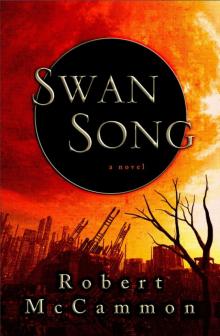 Swan Song
Swan Song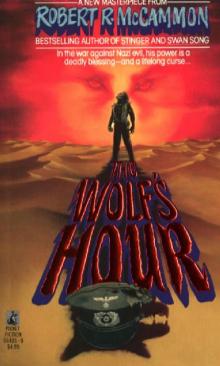 The Wolfs Hour
The Wolfs Hour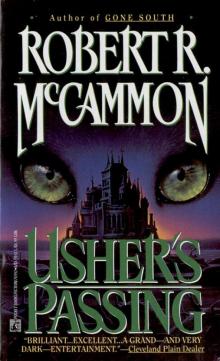 Ushers Passing
Ushers Passing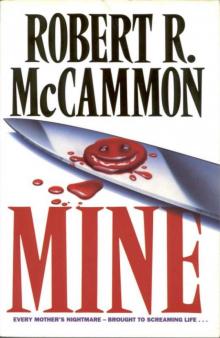 Mine
Mine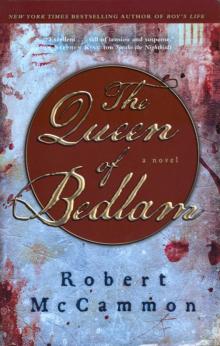 The Queen of Bedlam
The Queen of Bedlam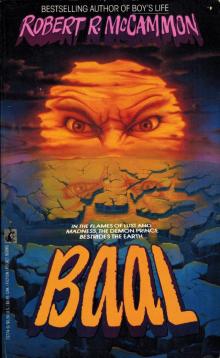 Baal
Baal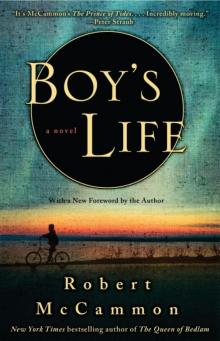 Boys Life
Boys Life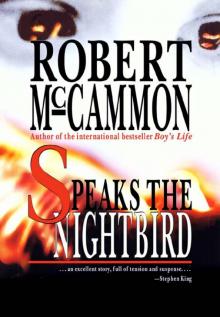 Speaks the Nightbird
Speaks the Nightbird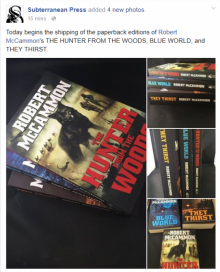 The Hunter from the Woods
The Hunter from the Woods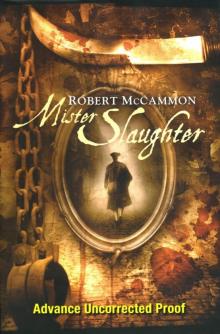 Mister Slaughter
Mister Slaughter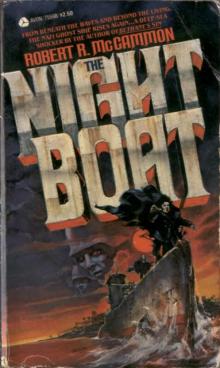 The Night Boat
The Night Boat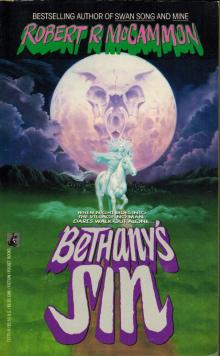 Bethanys Sin
Bethanys Sin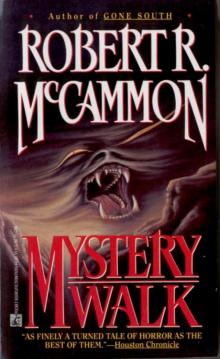 Mystery Walk
Mystery Walk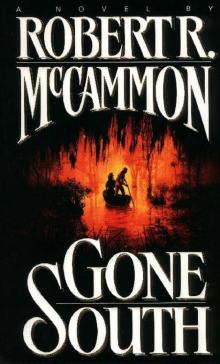 Gone South
Gone South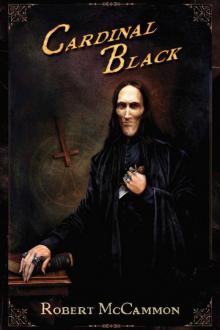 Cardinal Black
Cardinal Black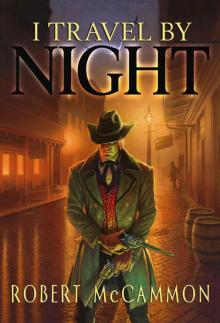 I Travel by Night
I Travel by Night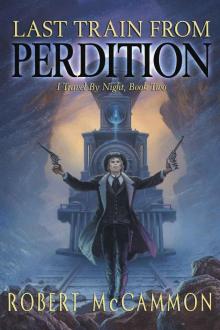 Last Train from Perdition
Last Train from Perdition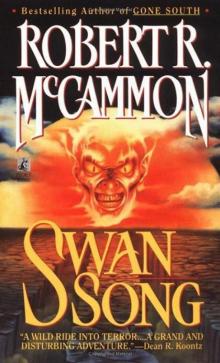 1987 - Swan Song v4
1987 - Swan Song v4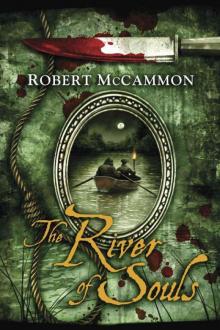 The River of Souls
The River of Souls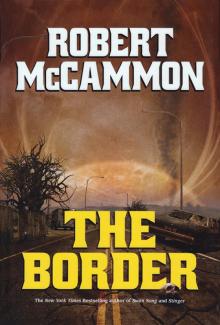 The Border
The Border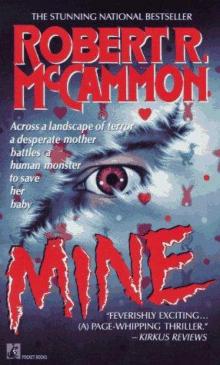 1990 - Mine v4
1990 - Mine v4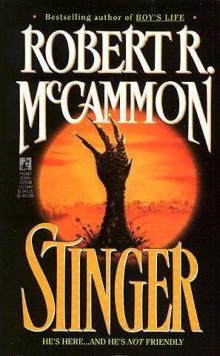 1988 - Stinger
1988 - Stinger The Listener
The Listener